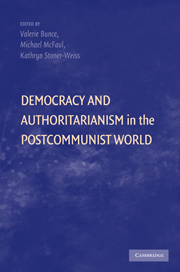Book contents
- Frontmatter
- Contents
- Prologue
- PART I WAVES OF REGIME CHANGE: FROM DICTATORSHIP TO DEMOCRACY…AND BACK?
- PART II ENCOURAGING DEMOCRACY: THE ROLE OF THE EUROPEAN UNION
- 3 When Europeanization Meets Transformation
- 4 Democratization in Postcommunist Europe
- PART III CHOOSING REGIME CHANGE: DEMOCRATIZING ELECTIONS
- PART IV RESISTING REFORM: BACKSLIDING DEMOCRACIES AND ENDURING AUTOCRACIES
- Epilogue
- Index
- References
3 - When Europeanization Meets Transformation
Lessons from the Unfinished Eastern European Revolutions
Published online by Cambridge University Press: 05 June 2012
- Frontmatter
- Contents
- Prologue
- PART I WAVES OF REGIME CHANGE: FROM DICTATORSHIP TO DEMOCRACY…AND BACK?
- PART II ENCOURAGING DEMOCRACY: THE ROLE OF THE EUROPEAN UNION
- 3 When Europeanization Meets Transformation
- 4 Democratization in Postcommunist Europe
- PART III CHOOSING REGIME CHANGE: DEMOCRATIZING ELECTIONS
- PART IV RESISTING REFORM: BACKSLIDING DEMOCRACIES AND ENDURING AUTOCRACIES
- Epilogue
- Index
- References
Summary
INTRODUCTION: UNDERSTANDING THE GRAVITY MODEL
One of the main theses of this book is that the international system plays a critical role in democratization, although a highly variable one. Undeniably, foreign influence was a powerful factor in the democratic transformation of Eastern Europe, from Gorbachev's decision that Eastern Europe needed to liberalize its Communist regimes to NATO bombing Milošević out of Serbian voters' favor and the European Union's commitment to include Romania and Bulgaria. There is no need for sophisticated analyses here: a simple counterfactual shows that if Communism as a global order had not broken down in Eastern Europe, the designated heir of Nicolae Ceauşescu, his son Nicu, would in all likelihood govern present day Romania, just as the son of Assad governs Syria and Kim Il Jong rules North Korea, following in his father's footsteps.
It is the “how” more than the “if” that is the focus of the present chapter, which concerns Europe's power to initiate and stimulate transformative processes in neighbor and/or accession countries. In comparison to the rest of the world, transitions with a European Union (EU) accession perspective have proved best so far: they seem to lead to democracy and prosperity faster and with smaller uncertainties and risks. This is the most robust illustration of the democratization mechanism known as the “gravity model,” “according to which fast and deep democratization is explained to a significant degree by the proximity and possibility of anchorage and integration with a major world centre of democracy.”
- Type
- Chapter
- Information
- Publisher: Cambridge University PressPrint publication year: 2009
References
- 2
- Cited by



